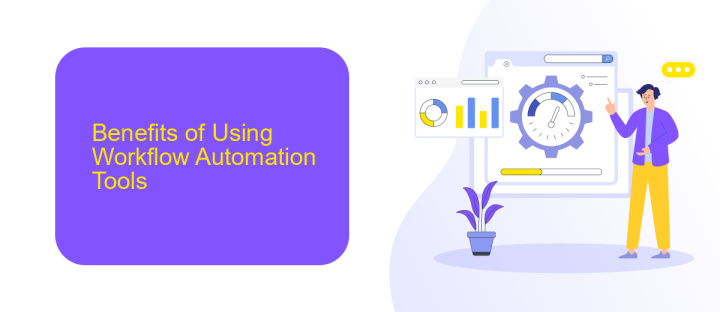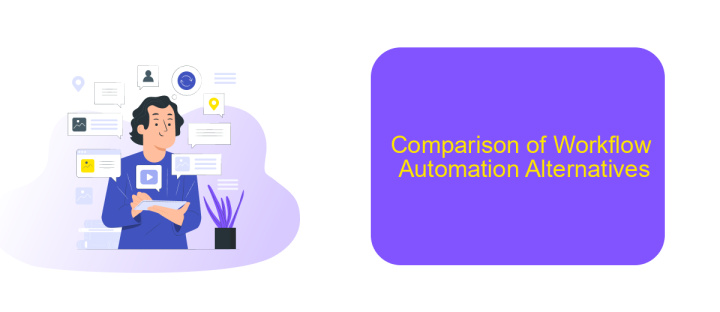Workflow Automation Alternatives
In today's fast-paced business environment, workflow automation has become essential for enhancing productivity and efficiency. However, with numerous tools available, choosing the right solution can be challenging. This article explores various workflow automation alternatives, comparing their features, benefits, and suitability for different organizational needs, helping you make an informed decision to streamline your processes effectively.
Introduction to Workflow Automation Alternatives
Workflow automation alternatives provide businesses with various tools and platforms to streamline their processes, reduce manual effort, and increase efficiency. These alternatives cater to different needs, ensuring that organizations can find a solution that fits their specific requirements.
- Low-code platforms: Simplify the automation process with minimal coding.
- Integration services: Seamlessly connect different applications and systems.
- Custom automation solutions: Tailored to meet unique business needs.
- Open-source tools: Provide flexibility and customization options.
- Cloud-based automation: Offer scalability and remote accessibility.
One notable integration service is ApiX-Drive, which allows users to connect various applications without extensive coding knowledge. By leveraging such tools, businesses can automate workflows, enhance productivity, and focus on more strategic tasks. Exploring these alternatives enables organizations to optimize their operations and stay competitive in today's fast-paced environment.
Benefits of Using Workflow Automation Tools

Workflow automation tools offer a myriad of benefits that can significantly enhance the efficiency and productivity of any organization. By automating repetitive and time-consuming tasks, these tools free up valuable time for employees to focus on more strategic and creative activities. This not only boosts overall productivity but also reduces the likelihood of human errors, ensuring that processes run smoothly and consistently. Additionally, workflow automation tools provide real-time tracking and analytics, enabling managers to monitor progress and make data-driven decisions to optimize operations further.
Another significant advantage is the seamless integration capabilities offered by many workflow automation tools. For instance, services like ApiX-Drive allow businesses to easily connect different applications and systems, ensuring a smooth flow of information across various platforms. This eliminates the need for manual data entry and reduces the risk of data inconsistencies. Moreover, such integrations can be set up quickly and without the need for extensive technical expertise, making it accessible for businesses of all sizes. Overall, the use of workflow automation tools can lead to substantial cost savings, improved accuracy, and enhanced operational efficiency.
Types of Workflow Automation Alternatives

Workflow automation is essential for streamlining business processes and increasing efficiency. There are various types of workflow automation alternatives available to cater to different organizational needs.
- Rule-Based Automation: This type uses predefined rules and logic to automate tasks. It is ideal for repetitive tasks and can be set up with tools like ApiX-Drive, which helps integrate various applications seamlessly.
- Robotic Process Automation (RPA): RPA uses software robots to mimic human actions and automate complex processes. It is suitable for tasks that require interaction with multiple systems.
- Artificial Intelligence (AI) Automation: AI-based automation leverages machine learning and natural language processing to handle tasks that require decision-making and data analysis.
- Business Process Management (BPM) Systems: BPM systems focus on optimizing and automating end-to-end business processes. They provide a comprehensive approach to managing workflows and improving overall efficiency.
Choosing the right workflow automation alternative depends on the specific needs and complexity of your business processes. Whether you need simple rule-based automation or advanced AI-driven solutions, there are tools and platforms available to help you achieve your goals.
Comparison of Workflow Automation Alternatives

When it comes to workflow automation, businesses have a variety of alternatives to choose from. Each tool offers unique features and capabilities, making it crucial to compare them based on specific needs and objectives. Understanding the strengths and weaknesses of each option can help organizations make informed decisions.
Some popular workflow automation tools include Zapier, Integromat, and ApiX-Drive. These platforms enable users to automate repetitive tasks, streamline processes, and enhance productivity by integrating various applications and services.
- Zapier: Known for its extensive app integrations and user-friendly interface, but can be costly for advanced features.
- Integromat: Offers powerful automation capabilities with a visual interface, though it may have a steeper learning curve.
- ApiX-Drive: Provides seamless integration setup and is particularly useful for businesses looking to automate complex workflows without extensive coding knowledge.
Each of these tools has its own set of advantages and limitations. Businesses should evaluate their specific requirements and budget constraints to select the most suitable workflow automation solution. ApiX-Drive, for example, stands out for its ease of use and robust integration capabilities, making it a strong contender for many organizations.


Choosing the Right Workflow Automation Alternative for Your Business
Choosing the right workflow automation alternative for your business involves a careful evaluation of your specific needs and objectives. Start by identifying the key processes that require automation and assess the complexity of these tasks. Consider factors such as ease of use, scalability, and the ability to integrate with your existing systems. Tools like ApiX-Drive can be particularly beneficial if your business relies on seamless integrations, as it offers a user-friendly interface and robust connectivity options with a wide range of applications.
Next, evaluate the cost-effectiveness of the automation alternatives. Compare the pricing models and determine which solution offers the best value for your budget. Additionally, seek feedback from other users or industry experts to gain insights into the reliability and performance of the tools you are considering. By thoroughly assessing these aspects, you can select a workflow automation alternative that not only meets your current needs but also supports your business's growth and evolution.
FAQ
What is workflow automation?
Why should I consider alternatives to my current workflow automation tool?
What features should I look for in a workflow automation tool?
How can I integrate multiple applications using a workflow automation tool?
Is it difficult to set up workflow automation for a business?
Strive to take your business to the next level, achieve your goals faster and more efficiently? Apix-Drive is your reliable assistant for these tasks. An online service and application connector will help you automate key business processes and get rid of the routine. You and your employees will free up time for important core tasks. Try Apix-Drive features for free to see the effectiveness of the online connector for yourself.

